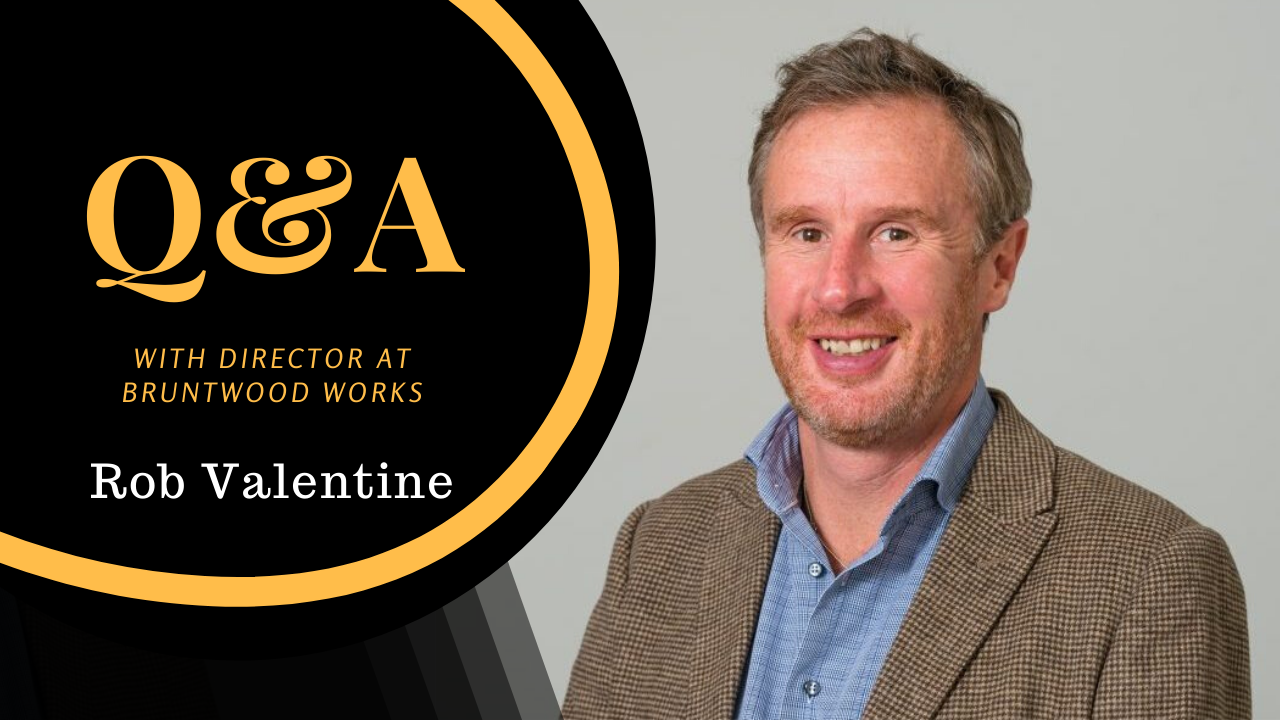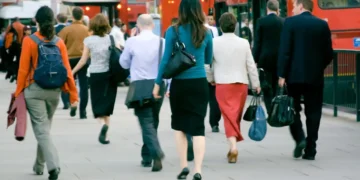- In a Q&A for Allwork.Space, Rob Valentine discusses how Bruntwood Works has adapted to the current situation and their next steps.
- Wellbeing has always been a priority for Bruntwood Works, and now they are assigning more space to wellness as part of their future vision.
- This vision includes tackling the “real crisis” of climate change by becoming carbon neutral by 2030 and advocating for a green recovery post-Covid.
Rob Valentine is Director at Bruntwood Works (Birmingham), a leading provider of flexible offices in the UK’s regional cities and a keen advocate for building sustainable, wellbeing-focused workplaces.
In this Q&A with Allwork.Space, Rob talks about Bruntwood Works’ plans to be carbon neutral by 2030 and why a “green recovery” is vital for our future of work. He also believes full-time work from home policies are “short sighted” as they are detrimental for organisational culture and only benefit a small and privileged segment of society.
Here are the highlights of our conversation.
Allwork.Space: What does the ‘current normal’ look like at Bruntwood Works and how do you see the next few months panning out?
Rob Valentine: Like a lot of spaces, we’re open but footfall is well down. I believe it will be after the New Year before we get to some sort of normality, whatever ‘normality’ is going to look like. I’ve been speaking with a lot of businesses, and each and every one say they will not be returning to the way they did things before.
We’re definitely going to see more flexibility in most organisations’ way of working and a move away from presenteeism. We’ve been seeing that trend over a number of years, and we’re now seeing an acceleration of that trend — my gut feeling is that we’ll see 5 years’ worth of change in around 6-9 months. That’s very significant.
Allwork.Space: You mentioned presenteeism, and the pandemic has certainly pushed wellbeing to the top of the priority list. Was this already a focus for Bruntwood Works before Covid-19?
Yes — very much so. A lot of organisations are rightly recognising that their core asset is and always will be their people. The successful organisations will be those that attract, retain and develop talent. A significant part of that is looking after their health and wellbeing. That is becoming increasingly important to the younger generations. Thankfully they think a lot more holistically and organisations are recognising that central to that is their health and wellbeing. If you’ve got a workforce that’s healthy and fit, they take less time off sick, they’re happier, productivity increases and you get better decisions, cooperation, and better outcomes generally. It just makes absolute sense.
Increasingly at Bruntwood Works we’re giving over more and more space to wellness. For example at Cornerblock in Birmingham, the old KPMG building, we added shower facilities, bike racks, a gym, even a sleep pod. We put a roof garden in — it’s what I call the ‘escape valve’. You can go up there with your laptop and on a pleasant day it’s a fantastic place to be. We also back that up with a programme of lifestyle and health classes, which are really popular. So we’re creating spaces in our buildings that really suit people’s needs, which gives us a competitive advantage. Wellbeing is becoming increasingly important now and I believe it’s only going to go in one direction.
Allwork.Space: Is the health crisis pushing the wellbeing agenda more?
Yes. What Covid-19 has done is accelerate the wellbeing trend by a number of years in just a few months. It’s changing organisational culture too. It has forced organisations to adapt very quickly. They’ve realised that by giving more freedom and flexibility to their people, it has had some positive results. Productivity has increased in some instances. It happened at Birmingham City Council — they’ve found that productivity has increased since their workforce started working from home. So now they’re completely rethinking their workplace culture. I suspect a lot of organisations have been pleasantly surprised at how well their people have adapted.
Allwork.Space: But it’s not all good… during a recent panel you noted that working from home only really benefits a small segment of society. Can you elaborate on that?
Large sections of our society have suffered far more than the top 20%. Early on, I was having conversations with senior people who were saying that lockdown is working really well for them; they had no commute, they were getting outside and exercising more. But then I was having flip conversations with colleagues. They were stuck in flats in city centres, not seeing anybody, it was horrendous.
Some people live in multi-generational homes and it’s a struggle trying to find a quiet space to work. A lot of homes don’t have great Internet connection either. So there are great swathes of our society who have been massively disadvantaged during this experience.
If we want an inclusive recovery, we have to think carefully about the role of the office. The office is the great democratiser. It delivers a level playing field for all people, where the opportunities are broadly the same for everyone.
Allwork.Space: And how is this experience impacting organisational culture?
It’s shortsighted to switch to working from home full time. You can’t build organisational culture over Zoom. Successful organisations are successful because of their people. How do you nurture, develop, and grow your talent, unless you’ve got that osmosis process where they spend time with peers and senior people? It’s about information transfer, skills that you develop in an office environment, and building a network. I’ve been relying on my own network for 20 years. But you only really build that by getting out there and meeting people and developing relationships. The office is really key to that.
Allwork.Space: Bruntwood Works is a regional business. Are you seeing a general shift away from city centres?
I’ve not seen much of it yet, but I do think regional cities will benefit. For a long time investment has been heavily focused on London and the South East, to the detriment of the city regions. Places like Manchester and Birmingham have been able to carve their place in the world, but a lot of places in the UK have literally been left behind. So there are fundamental issues, which are now being addressed.
I believe there will be a number of economic packages to support our regional cities, and a lot of investment in terms of connectivity — both physical and digital connectivity. So that provides a significant opportunity for our regional cities.
At the same time, in London, the tube is really the only option to get to work, but nobody wants to get on the tube in mass numbers at the moment. It must be quite a frightening experience. So I do think we’ll start to see organisations move functionality into regional cities. There are a lot of advantages. One is affordability — in London if you’re a young person, what hope do you have of owning your own property? You end up living in shared accommodation, which isn’t great when you’re planning your future. But in Birmingham it’s much easier to get on the property ladder — it’s more affordable and better quality.
Regional cities have also become much more vibrant in terms of cultural offer, retail, eating out, and access to countryside. It’s a no brainer. So again I think we’ll start seeing an acceleration of that trend. This might also invigorate a lot of peripheral towns and generate more localism. I live in a market town and before lockdown, I hardly spent any time there as I always left the house early and was rarely home before 8pm. Lately I’ve been walking into town, doing local shopping, it’s been a great experience! If we get more work flexibility we’ll see more of that. It has the potential to really benefit our local towns and economies. If we embrace this as a policy then the effects on the environment could be very positive too.
Allwork.Space: Speaking of the environment, what are your thoughts on a ‘green recovery?’
Recovery is going to be focused on sustainability. Covid-19 is a crisis, but it’s one that we will defeat, probably in the next 6-7 months. But the real crisis is climate change.
40% of carbon emissions come from the built environment. We need green technology, green jobs and a green recovery. It’s so important. Certainly at Bruntwood, that is our prime focus right now. We’ve got a working group looking at how we become carbon neutral by 2030. The building techniques are out there and we need to be adopting them.
Technology has a big role to play. For instance, big data captures temperature differentials and you can use it to naturally heat or ventilate buildings.
Technology also means we travel less. If I’m adopting technology to conduct more meetings, that means fewer trips to London. Face to face meetings are still really important, but there’s a lot you can do over Zoom so a blend of the two is the right way to go. And if I’m only travelling to the office three days per week instead of five, that’s four journeys I’m not doing.
Allwork.Space: Is this Bruntwood Works’ vision, or are your clients pushing for greener workspaces?
Our more progressive customers are asking for sustainable changes. Not all of them are there yet, but they will get there. We need to be ahead of that trend and I believe we are. We want to lead on this. We’re long-term investors, we want our regional cities to be successful, and to do that we have to have sustainability at the heart of our recovery plans and our long-term future.
Allwork.Space: Looking ahead, beyond the next challenging few months, what’s coming up for Bruntwood Works?
Adaptation of our existing model. We’re changing our offer to have more focus on wellbeing and increasing use of technology so there are fewer touch points in buildings. Ultimately we’re working more closely with our customers to help them deliver the kind of environment that works for them. We’ve got a whole design team focused on that at the moment, to support our customers through these changes.
More and more, organisations are seeing the value in this approach. Decisions around space used to sit with CEOs and FDs, now the HR leaders have a much greater say. And quite rightly. They’re putting their people, their talent, at the heart of the decisions that are made. Progressive CEOs are recognising the importance of this now too.
Things change at such a pace now. When I joined the business 20 years ago, it was pretty methodical — we delivered a certain type of space with a certain type of carpet and lighting, and that was your standard spec. Then we started making receptions and meeting rooms a bit nicer. Now, we’re thinking far more about our customers’ needs and we’re actually getting ahead of those needs. I think it’s a really exciting place to be.



 Dr. Gleb Tsipursky – The Office Whisperer
Dr. Gleb Tsipursky – The Office Whisperer Nirit Cohen – WorkFutures
Nirit Cohen – WorkFutures Angela Howard – Culture Expert
Angela Howard – Culture Expert Drew Jones – Design & Innovation
Drew Jones – Design & Innovation Jonathan Price – CRE & Flex Expert
Jonathan Price – CRE & Flex Expert














